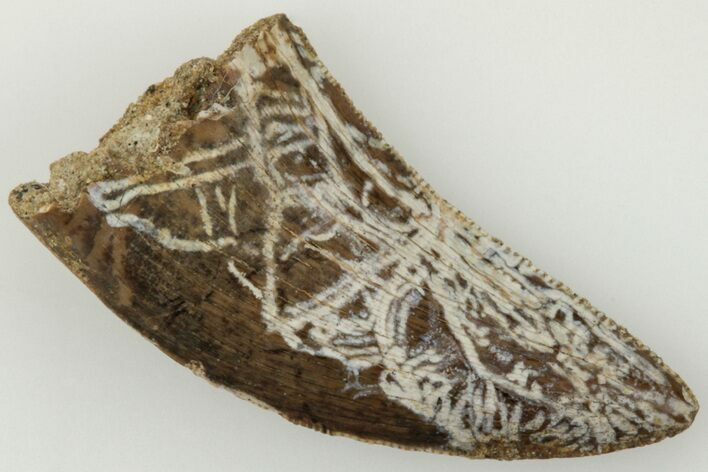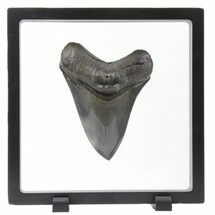This Specimen has been sold.
Serrated, .91" Tyrannosaur (Nanotyrannus?) Tooth - Montana
This is a .91" long Tyrannosaur tooth likely of the species Nanotyrannus lancensis, collected from the Hell Creek Formation of Eastern Montana. The enamel and serration preservation of this tooth is very nice.
Comes with an acrylic display case.
Comes with an acrylic display case.
Nanotyrannus vs. T. rex
Paleontologists debate contentiously about whether Nanotyrannus and Tyrannosaurus rex (T. rex) are really the same species, where Nanotyrannus represent juveniles. Papers going back and forth on the topic continue to be published, but even more fossil evidence under study has yet to be published. We tend to fall into the camp that Nanotyrannus is in fact a separate species.
No matter where you fall on the Nano vs T. rex debate, there are clearly two different Tyrannosaur tooth morphologies present in the Hell Creek Formation. The larger teeth, usually 2 1/2 inches or more, can confidently be labeled as Tyrannosaurus rex. For the smaller teeth, main distinguishing characteristics between the two morphologies is the shape of the base, compression of the crown/tip, and presence of a "pinch" at the base. Serration density does not appear to be a distinguishing factor since it varies based on tooth position.
We are labeling based on morphology. The longer, thinner, and more compressed teeth with a pinch at their base are labeled as Nanotyrannus. The fatter teeth with a more rounded tip and no pinch at their base are labeled as Tyrannosaurus rex.
Paleontologists debate contentiously about whether Nanotyrannus and Tyrannosaurus rex (T. rex) are really the same species, where Nanotyrannus represent juveniles. Papers going back and forth on the topic continue to be published, but even more fossil evidence under study has yet to be published. We tend to fall into the camp that Nanotyrannus is in fact a separate species.
No matter where you fall on the Nano vs T. rex debate, there are clearly two different Tyrannosaur tooth morphologies present in the Hell Creek Formation. The larger teeth, usually 2 1/2 inches or more, can confidently be labeled as Tyrannosaurus rex. For the smaller teeth, main distinguishing characteristics between the two morphologies is the shape of the base, compression of the crown/tip, and presence of a "pinch" at the base. Serration density does not appear to be a distinguishing factor since it varies based on tooth position.
We are labeling based on morphology. The longer, thinner, and more compressed teeth with a pinch at their base are labeled as Nanotyrannus. The fatter teeth with a more rounded tip and no pinch at their base are labeled as Tyrannosaurus rex.
Because of its age and sedimentary composition, the Hell Creek Formation has become one of the most paleontologically studied areas in the world. 158 genera of animals and 64 genera of plants are known from the formation and new discoveries are made frequently. In addition to Tyrannosaurs, Ceratopsids, and Hadrosaurs, the formation has yielded remains of amphibians, reptiles, lizards, snakes and turtles, fish and sharks, avian and non-avian dinosaurs, and mammals. The Hell Creek Formation gives the most complete understanding of the environment just before the Cretaceous-Paleogene extinction.
SPECIES
Nanotyrannus lancensis?
LOCATION
Private Ranch, Eastern Montana
FORMATION
Hell Creek Formation
SIZE
.91" long (straightline)
CATEGORY
SUB CATEGORY
ITEM
#204056
We guarantee the authenticity of all of our specimens.
 Reviews
Reviews












